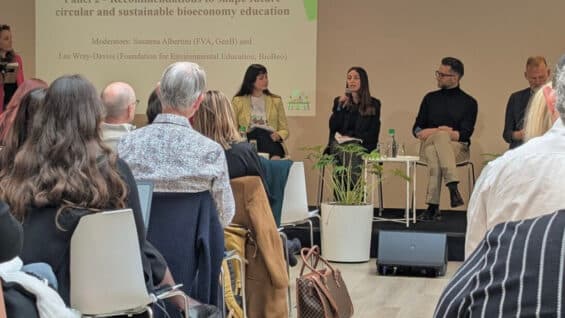The Saaremaa Pilot Region Held its Demonstration Workshop on April 2nd
The pilot region demonstration workshops kicked off with the Saaremaa region on April 2nd. The focus of the workshop was to demonstrate the results of the project as well as provide insights from the region by local stakeholders.
The workshop kicked off with Anne Põder from EMU introducing the project BlueRev.
Mihkel Urmet, a local entrepreneur and representative of NGO Ruhnu Kultuuriruum and Planet Ruhnu, discussed his experience and progress in a macroalgae-based business idea in the presentation “How to sell algae that you don’t have yet? – Vegan fantasies and macroalgae product development news from Ruhnu”. He utilises local maritime heritage and local resources on remote islands but also struggles with various challenges, including building the required infrastructure and finding technological solutions, finances, and support.”
Indrek Adler from the enterprise Aqua Verde shared his experience in a presentation, “The pain and gain in setting up a mussel farm”. Indrek has been working on valorisation options for mussels also in these master’s and doctoral studies and provided context on what is the present knowledge, outlook, and promising developments in the Baltic Sea, as well as regulatory hurdles. Mussel farming has the potential to provide a significant contribution in helping to address the eutrophication; however, at present it is not economically viable in the Estonian context and needs further exploration. Mussel farming in trout farms was also one of the new business models discussed in the BlueRev workshops last summer.
A local social innovation and cooperative action case was presented by Georg Linkov from Hiiumere Farm and the Estonian Offshore Aquaculture Association, who shared the story of how they established the producer’s cooperative Estonian Offshore Aquaculture Association and what the challenges have been. The cooperative was established in 2019 and at present has 8 organisations as members. An important aspect of the development has been using the lessons from the failures of previous cooperatives in the field.
Alessia Careccia from APRE provided a training on “How to effectively communicate innovation in the blue bioeconomy sector”, including what to pay attention to in the communication process, what kind of channels to use, how to present innovation in the blue bioeconomy, and how to avoid the pitfalls of greenwashing.
Tanel Ilmjärv from Vetik OÜ is working on red seaweed valorisation and shared his journey that started in 2016. His presentation ““Blue bioeconomy in practice: Creation of value chain for red seaweed and science cooperation” discussed the red seaweed as a bioresource availability, the potential use of red seaweed compounds, economic viability of cultivation and different products. The enterprise began by exploring pigment extraction technologies and subsequently expanded its scope to include research on biocompound extraction.
Annika Teino from the Estonian Ministry of Regional Affairs and Agriculture provided an overview of the upcoming national research funding measures aimed at the fisheries and aquaculture producers as well as feedback on what have been challenges from the previous rounds of the funding.
Tarmo Pilving from EMU discussed the coastal tourism opportunities in the blue bioeconomy context in the Estonian islands. The presentation covered practical examples of what format blue bioeconomy-related tourism can take; what services, incl. to production facilities, product tasting, and selling of lifestyle, could be explored; and what would be effective sales channels.
Anne Põder from EMU gave a more detailed presentation on the good practice examples that were collected in the BlueRev project in all three pilot regions of the project. Those include the macroalgae developments and the various social innovation examples the local stakeholders provided in the BlueRev interviews and workshop in Saaremaa. The practices from the Denmark and Greenland pilot regions included fish by-product valuation, an innovative business model for Omega-3 drinks, and a pet food case from Greenland. We used the case of Ritunnu Salatu to demonstrate good practices from the Italian region.
The workshop finished with a discussion of the policy recommendation that the BlueRev partners concluded based on the project.




